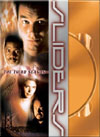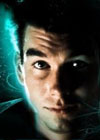Time or Parallels?Of course, this adventure often acts more like a time-travel story than a parallel universe story. Arturo's explanation for that may be a bit hokey, but at least it clearly establishes that this is still a parallel universe, just one that hasn't yet caught up with most others that we've seen so far. So you have to wonder a bit why we end up going through most of the usual time travel arguments found in other sci-fi forays into this idea.First and foremost, considering the number of alternate Quinns we've encountered so far, what makes our group so sure that the local young Quinn they encounter in this world is heading for exactly the same conflicts that their own Quinn went through in his childhood? How do they know that things aren't already set to be slightly or wildly different in this world? Food for thought, though in the end this is a minor point. The episode works well anyway as is. More glaring are the Professor's early comments that our older Quinn mustn't interfere with his younger self's life. I'm specifically curious to know WHY he thinks that should be so when he first brings it up, and it feels bizarre for him to not give his reasons. On the surface, it sounds like the ignorant twaddle most sci-fi protagonists argue over when they're afraid of creating a history different to the one they remember or read about in history books, as though all of time would go to hell in a handbasket if they did. On the other hand, is Arturo making the shrewd psychological observation that older Quinn is in danger of "enabling" his younger self to depend on outside help to solve his personal challenges? If that is the case, then excellent! Perhaps the dialogue could be improved to make that more clear though, and prevent confusion with temporal dynamics. Part of the real beauty of this episode, however, is how the characters are all working to get closer to the hearts of the real issues that trouble them, and their dialogue gets better and closer to hitting the mark as the episode progresses. There's a good real-life believability to it in that respect. And the mentoring dynamic between the two Quinns gets better and better as it goes from possible "enabling", to the idea of young Quinn learning to assertively claim his own personal space, to understanding the difference between assertively claiming vs. falling victim to passive-aggressive patterns. Damn, this is good! 1980's Doctor Who script editor Eric Saward could take lessons. In the end, I really have to give big Quinn an A+ on the hero meter today. He really knows what he's doing in this one, better than anyone else, and I love the way he manages to convince the others over to his side before he's done. Very excellent!
The Arturo plot is interesting, because it has the potential to be a success or a disaster depending on how it is handled. In this episode, it does manage to be a success, firstly because we get so much character gold from it in the dialogue between Quinn and the Professor, and secondly because it leads to such joyful, live-for-today exuberant expressions in the rest of the Professor's activities. All great stuff. The caveats for Arturo's plot include the fact that the actual ailment is left completely vague, like they forgot to fill in the blanks in the script. Also, how trustworthy are the medical methods on the world where the Professor got his diagnosis? The episode really does nothing to define that world in any way, and personally I wouldn't place much faith in western doctors to know how to cure anything detected by MRI scanners or whatever it may have been that the Professor stepped into in the opening scene. The biggest caveat of all, though, is simply that this is meant to continue as a bit of an arc for this character. Which leads me to this question: What do they ever think they're going to be able to get out of it in the future? How will it create good drama when it comes up in another episode? Though it is made to work wonderfully here in "The Guardian", I think they pretty much used up all of its positive potential here, and even then, it seems like the episode spends a bit too much time focusing on the idea of "loss" to fuel character scenes. Unlike Star Trek's Ronald D. Moore, I don't believe this is the most interesting way to get into characters, particularly not if you're aiming for the ideal. In the long run, this new arc of the Professor's turns out to be a bit of a dead end, and "The Guardian" is really the only episode in which the idea truly worked.
When I Kissed the Teacher...It's almost a tertiary subplot to see big Quinn on new footing with a double of his former public school teacher, as we wonder if he'll even want to avoid the romantic implications that she seems to expect. Curiously, this relationship seems to be the litmus test for Quinn's sense of honesty, because let's face it, he does go around sporting a false identity to nearly all the locals he meets on this world. The truth of course might just be too awkward to allow him to help the way he wants to. But to be fair, like just about all the other dynamics in this episode, Quinn's honest admissions grow towards the end, until he at last gives the teacher the final two clues she would need to put the whole thing together in her own head - his real name, and the sight of the vortex. Nice dynamic, leaving one ultimately satisfied with the honesty issue.I have to say, the guest cast is quite good for this episode, as both younger Quinn and the teacher are very well cast, and of course Linda Henning returns to reclaim the role she created in the pilot as Quinn's mother. Good stuff. Music for this episode is chiefly a lot of very quiet, understated emotional underscore. It all works wonderfully, but there isn't much there in terms of easily recognizable themes or large excitement. It's more tear-jerker stuff, and it works pretty well. The music is at its liveliest in the opening and closing scenes, bookending the story with the excitement of sliding and discovering the unknown. In the end, a nice job by incoming regular composer Danny Lux. It is with a bit of sadness that we ask: Is this truly Tracy Tormé's last Sliders script? If so, he goes out on a high, and will be VERY sorely missed. This is possibly the very best story he ever wrote for Sliders.
This story has become available on DVD. Click on the Amazon symbol for the location nearest you for pricing and availability:
Comments on this article are welcome. You may contact the author from this page:
|








